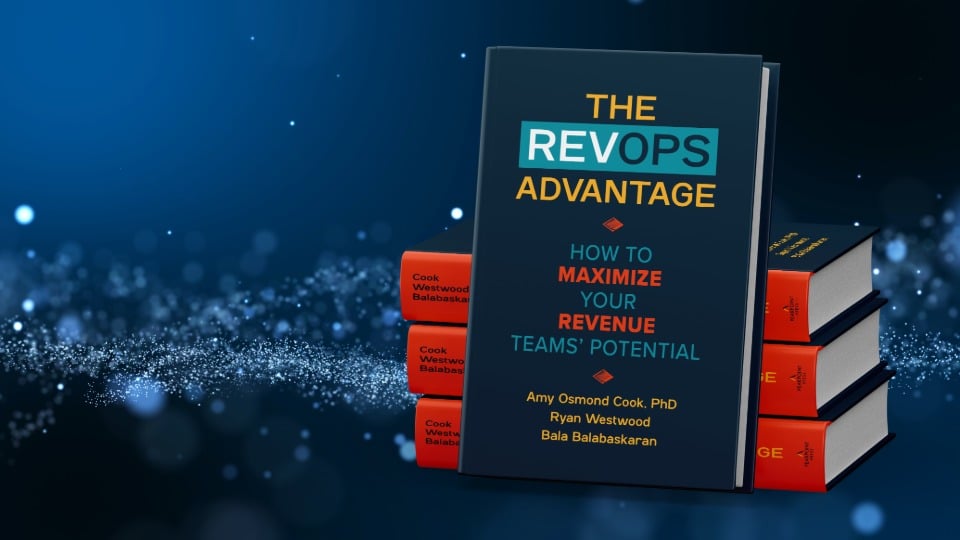Collaborating with Global Teams
Overview
- What were the differing types of cultures you saw when working in these foreign countries? [1:56]
- What are some cultural aspects to think about that might change how you structure RevOps plan? [7:44]
- Is there anything else people might need to think about as they go into global expansion? [10:43]
- What are some coverage models that you that saw that worked really well? [12:17]
- Did you see any differences between the two countries’ go to markets? [13:42]
- What are your thoughts on Ops teams in different regions collaborating with each other considering different time zones and work cultures? What did you see that was successful? [17:21]
- Could you expand on the “after work get together” in Japan? [20:55]
- What are some things to avoid when collaborating with global teams? [24:15]
- Covid aside, do you think it’s a good idea for teammates to travel to these places? Maybe once a year? [26:02]
- Final Thoughts [28:54]
Introductions
Tyler
Hello, everybody. Welcome to the Fullcast Fireside Chat. I’m your host, Tyler Simons, Head of Customer Success at Fullcast, and we are a go-to-market planning and execution platform. Today our topic is “Collaborating with Global Teams”. Our guest is Jamie Klanac. I’ll go ahead and turn the mic over to you to give yourself a little intro and then we’ll jump right in.
Jamie
Thank you, Tyler, and thank you fullcast.io team. I am Jamie Klanac and I was with IBM for a very long time where I held revenue operations leadership roles in global, in North America, Latin America, and then lived four years in Asia where I spent two years in Tokyo, two years in Beijing running billion dollar segments of IBM’s business and about 1000 reps in each of those geographies. I most recently was with a company here in Tampa that I just recently left and I will be starting a new role on Monday so I’m delighted to be here.
Tyler
Congratulations. I didn’t know that. That’s awesome. You and I had some discussions early on and we really honed in on this culture aspect. I think it’s a little bit different than what a lot of people think about when they talk about Revenue Operations and SalesOps. I think it’s a really important thing to cover. You’ve seen it. You’ve been in different areas and you’ve lived there, so you’ve seen these different cultural aspects and how it might specifically impact operations.
What were the differing types of cultures you saw when working in these foreign countries? [1:56]
Tyler
So I’m curious from your perspective and your experience as it relates to organizational design and as you go to build out revenue operations structures and you have sales teams and things like that as it relates to organizational design and things like that. What’s the different types of culture there?
Jamie
So we hit the organizational design and the go to market, but I think the overlaying structure and culture is a big deal. This isn’t necessarily just for revenue operations. It’s all going to a new culture in foreign land 8000 miles from my home. So my first role was in Tokyo and it was after the tsunami and so they were still recovering and that kind of thing that was going on. One of the things you’ll notice just going into an office with people that have worked in Tokyo, is how quiet the office environment is. As an American, it was much different. Our marketing director was from the US and then everybody else is Japanese, so we were a little too loud in the office. But, Thursday at 3:00, it would be very quiet. That means they’re working very hard. It just wasn’t the chatter or the things that you’re used to in the US office or Western office.
But one of the big things that culturally is a big deal in business in Japan is a thing called “nomunication”. So “nomu” means “to drink” and you got the rest of “communication”. So “nomunication” was a big deal. You’re going out after work and sitting down with colleagues, your team, or your management and hanging out and talking. Not necessarily about business, but getting that relationship. That’s where a lot of the networking happened and it was penalty free.
So contrasting that with the office environment of how quiet it was in a normal business day. Wide open, lot of fun. Happy hour starts at 7:00 or 8:00 at night. I’ll talk a little bit about the work day, but it was a lot of fun. Ate a lot of awesome food, things that you never heard of in my mouth and nothing goes to waste.
So one of the other differences coming from the US and having been this casual for a long time is in Tokyo, you wear suits, our customers wear suits. So that was something that was a little different. Putting on the ol’ tie, but it was part of the culture. From July to September it is very hot in Tokyo. So I would go catch the subway early in the morning, at 6:00, and it would feel like noon and very hot. So they had what they call “Cool Biz” so you could go wear your suit but without a tie. From July to October.
Tyler
By the way, does this count as a suit? I’m just thinking about the difference. I’m in the Pacific Northwest and we have a very different attire. I’m wearing a jacket, it is snowing outside, but like this is my “business suit”. Very different in terms of just what is expected in terms of attire and the contrast between the two places.
Jamie
Absolutely. You would not. The day would typically start around 09:00 and then they always stopped for lunch and we had an awesome cafeteria where it was all of the Japanese food, everything that you would think. Any Japanese restaurant is awesome so you had lunch and then you would work and then typically there was even dinner served at night. So it’s kind of a long gated day.
Then one of the things too just culturally, and I find myself doing this, is a lot of times employees would stay until the manager left. So sometimes I had to do a head fake and leave and come back because a lot of them would just stay there. Sometimes it was a personal choice because a lot of times the offices were nice. You had high speed Internet, you had everything you needed right there, so that was just part of the culture. Wonderful, wonderful people.
Then when I went to Beijing, a little bit different. When I went, there was more of a millennial team, more women that I had on my team. Very similar in not going out as much. It wasn’t nomunication, but we did have the team parties and dinners and things and everything’s on a lazy Susan. So that was always the life.
What are some cultural aspects to think about that might change how you structure RevOps plan? [7:44]
Tyler
It’s very interesting. Let’s say the Rev Ops team is based here in the US, and they’re starting to expand into Japan, China, anywhere really in APAC. What are some of the things they might need to think about culture wise that would change how they would want to structure their go to market, their comp plans, or things like that?
Jamie
Not much different. It was marketing, it was all the go to market, it’s pipeline, it’s forecasting, it was commissions, all of those things. So not much different in terms of that. But it is pulling it together and I think that it’s probably similar in a way. We’re going through it right now in the U.S., where it makes sense to knock down those silos and bring everybody together. Believe it or not, early on that’s what we tried to do.
One of the things that I found outside the US that was different, particularly in China and in Latin America was really the partner channel. IBM is a big brand name, but you want to buy locally and who you know. So that was a big deal with having that partner channel and the whole thing, the whole ecosystem that went along with it.
Tyler
That’s super important. You have to know when you’re entering a market that there’s going to be certain ways to go to market and depending on what the culture is. To your point with LATAM, when IBM started to roll out there, they needed partners because it was a bilocal type of thing and it might be different in Japan, Australia, China, etc. and those are the things you need to think about. Go ahead.
Jamie
You’re absolutely right. The other piece of it is the routes to market. I think you kind of bring up a point, particularly in Latin America where as I remember, some really low percentage of people had telephones, but at some point everybody had laptops and Internet. So they kind of leapfrogged and got into this digital market kind of ahead of everybody. So they were behind in terms of inside telesales. So that’s kind of an interesting thing that I saw, and I saw some of that happen in Asia as well.
Is there anything else people might need to think about as they go into global expansion? [10:43]
Tyler
Yeah. Now we talked a little bit about having teams here in the US and working as you start to go into this global expansion, is there anything else that people might need to think about as they go into global expansion and whether that’s in APAC or EMEA.
Jamie
Yeah. So there is one thing I had to think about that wasn’t on my bucket list. I’d been to Asia before when traveling, but living there was much different. Coming in they had huge Metropolitan areas like Tokyo or in Beijing. They did have geo expansion. But then you’d go in South China or somewhere out in Japan where you didn’t have the critical mass of people and you were still trying to do some face to face business. So knowing everything or having that or that very specific brand knowledge, having that domain expertise didn’t always translate when you got outside of those Metropolitan areas. So you had to have a coverage model that was nimble enough to recognize “Hey, we have people that are sitting there that are smart people, but we may have to have a model where we fly people in”, and it could be globally, it could be from Metropolitan areas of that kind.
What are some coverage models that you that saw that worked really well? [12:17]
Tyler
Yeah. What were some of the coverage models that you saw that worked really well?
Jamie
So if you think about 1000 reps in Japan and then about the same engagement in greater China, which includes Taiwan and Hong Kong, we had inside sales. So it was segmented SMB mid market kinds of coverage. We had face to face where we had client relationship, people that were out there with the customers. You had these brand specialists that were very domain experts. Then you had portfolio reps, too, that knew it could be a specific product that has a lot of different SKUs and things. Then you had partners that you could bring in.
We did have a segmentation of the SMB mid market, and we had named accounts, which IBM called integrated accounts and these were $100 million accounts. We did have some headquarters like bank of China in Beijing, some of the big banks. We had Toyota, etc. in Japan, similar, but all the above.
Did you see any differences between the two countries’ go to markets? [13:42]
Tyler
Did you see any differences between the two countries’ go to markets? I’m going to focus on Japan and China just because I want to see if we can really tease out some of the differences between the two go to markets and what would have been maybe successful in Japan, but if you tried to do that in China, it wouldn’t have worked or vice versa.
Jamie
Good point. Two totally different places. So one of the things in Japan is that they have this thing they go through. When you’re talking about account based marketing or account based experience and who are all the influencers? Well, that is exactly what happens in buyer groups and they go through this thing called the Ringi process. The Ringi is where they get consensus and that’s a big deal in Japan. So there’d be a lot of times when we would hear about deals. “Hey, they’re in Ringi.” Which is good. Meaning it’s a go or no go kind of a thing.
I’ll also kind of touch on the holidays because it really matters in showing the difference between the two. So in Japan, you have golden week, which is typically in May. Let me back up. There’s a special week in the beginning of the year, and they don’t really celebrate Christmas. So few days after Christmas, all the way to that first week, everything shuts down. Customers, everybody shut down in Japan. So you can kind of get your New Year resolutions done and things of that nature. Then you get into May where you have their golden week, which is a big deal.
They do a lot of things in mass, meaning that people wait, they’re off that week, everybody’s on vacation, Golden week. Of course people do take vacations, but it’s kind of scheduled. Then the whole fiscal year ends March 31 for the government of Japan. And so you have to kind of deal with that.
You go to China and it’s a little bit different. They don’t have the Ringi process, they’re a little more Western. By the way, much more partner centric was my experience there. It was similar there with relationship and going through the whole process. They have their Chinese New Year, which is typically end of January, February, and everybody takes off, and that’s a big deal. Then they have their Golden week. It’s like in October and everybody takes off. So everything’s in between.
To note some similarities, Tokyo very crowded, Beijing very crowded with people. Those are some of the things that you deal with is that you just get used to crowds. And just one little quick story. When I came back from China, literally had been back a week. I was in Manhattan, and I was thinking about how peaceful Manhattan was walking down the street. So you get the idea, right?
Tyler
Yeah, I can imagine. I spent some time in Vietnam, and when we came back, it was very quiet. A lot less horns and stuff like that and just reverse culture shock. I think that’s what they call it.
What are your thoughts on Ops teams in different regions collaborating with each other considering different time zones and work cultures? What did you see that was successful? [17:21]
Tyler
Let’s say you’ve grown, you’ve expanded globally, and you now have an Ops team in EMEA. You have an Ops team somewhere in Australia covering APAC, or maybe there’s an Ops team in Japan. How do you think about these Ops teams collaborating with each other, like dealing with time zones and maybe different ways of working? What did you see that was successful? And maybe like on the IBM days, like you collaborating back with the US and having those conversations. What are some things that worked really well?
Jamie
That’s an excellent point. So before I went to Asia, I never really thought about time that much. And what I found when I was in Asia, that 07:00 AM calls would be 14 hours later making it start at 09:00 PM here. Depending on the time of year, 13 or 14 hours in Tokyo, 12 or 13 in Beijing. I never really thought about it. But then when I got there, you start realizing that Japan is not the 53rd state. It is different. And so, “hey, Jamie, let’s have a call first thing Friday morning at 07:00 AM.”
“Okay. I’ll be in the pub. It’s 09:00 PM in Tokyo. Or how about this? Why don’t we wait till 07:00 PM your time, and I’ll talk to you by Saturday morning.’ But you get the idea here.
The empathy of the time and understanding that not everything is on New York time. And so that is a big deal, just to make sure that you share it. And a lot of times you never hear anybody complain. I’ve had colleagues and I’ve taken the calls on the Friday night, midnight calls kind of thing. But it’s just something to think about when you’re scheduling time. It was always back and forth, and I work, but my global team was really good about those kinds of things, too, where they were back and forth.
Now, to answer your question, I was in global roles as my last role in IBM. At the time we had seven geographies, but I think they’ve since changed. So you think about the Matrix and the company at large. This happens in these big Fortune 500s, and then some of the guys that we’re talking to now who are in startups, this could also eventually happen to them is that you’ve got this Matrix management thing.
I had seven operations managers out in the Geographies. I had an immediate staff, global staff, then I had a boss, but they had an operations boss, but they also had the sales leader or marketing leader within the geography. You have to understand all those things. You can’t just think you’re the only game in town. So it’s a lot of collaboration, and I think it’s understanding, and it’s empathy and then it’s also about working. So this is complicated if you let it manage you. Communication is huge with all the above, with the management team, with the Ops colleague, all those things.
Could you expand on the “after work get together” in Japan? [20:55]
Tyler
Yeah. I really thought it was interesting when you were talking about Japan and kind of this “after work get together” type stuff. And it sounds like maybe a lot of work actually gets done then potentially, or is that just more of like a hanging out type of thing?
Jamie
I would say not a lot of “business” gets done. Like, we’re not going to sit down and talk about spreadsheets and models. But it’s a trust thing. It’s the networking. It’s “we have this conversation. I saw you last night. We both wake up with a headache tomorrow, but we’re in it together kind of a thing. And I think that is the byproduct of communication. And look, I’ve got the proof here of three or four nights a week with that. It’s something that I’ll remember for the rest of my life. It was just a fantastic experience. Just most awesome people you’d ever want to meet.
Tyler
Yeah. And I bring that up because I think that’s what I’m really honing in on here is that as you have these teams that are distributed globally, not only do you have to be sensitive of time zone stuff, which I’m awful at because I’m very specific. I like to go to bed at like 8:30. So essentially the traditional ways of working or your work mentalities no longer apply as strongly here.
To think about just in a specific example of Japan, building that trust across oceans becomes really critical in thinking about how to do that. It might be different for China, it might be different for Australia to either build trust or rapport so that you can collaborate more closely. I think that’s going to be really important as your teams are trying to figure out like, well, this is what we’re going to do in the US and this is how that’s going to tie in with our business in EMEA. And we need to be talking. We can’t just be siloed and “you’re going to go do whatever you’re going to do and I’m going to go do whatever I’m going to do.” I don’t know that that’s best for the business.
Jamie
Just on that point. There’s a hunger. There is a hunger to be global and be more collaborative. If you think about it, Japan is this island and China with the GCG, they do have a hunger to collaborate between the two. I wasn’t involved in calls, but we did some outsourcing and things. But also with their EMEA and US partners, they understand how to go global. And by the way, their customers want that too. Sony wants that, the big banks in China want that in terms of understanding how this all fits together and getting the best to bring, best of process, learning and collaborating. And that’s why the networking is so huge now to collaborate globally.
What are some things to avoid when collaborating with global teams? [24:15]
Tyler
Yeah. What about some things to avoid? You’re expanding globally and building teams. What are some assumptions that maybe we make that should be avoided?
Jamie
I probably made many of them that I didn’t even realize I made. There is speaking too fast for one. I tend to do that. The other thing is things like, “hey, cut it out”, and they go, “what?” It just doesn’t translate or when you say something.
Then the other thing is listening skills. Trust me, their English was a lot better than my Japanese or Mandarin was. Trust me, I had the utmost respect for many people that speak two and three and four languages. But being able to really listen and understand. But then sometimes you don’t understand. So it takes a little bit longer on some of the conversations and that’s not because of them. It’s because of how I’m receiving, bringing it in and then making sure that you’re totally clear that you’re not being ambiguous in the discussion or assuming anything. And that’s what I learned. Not initially. Some of those things kind of got by me, but over time you just had to kind of stop to make sure that you were communicating clearly.
Covid aside, do you think it’s a good idea for teammates to travel to these places? Maybe once a year? [26:02]
Tyler
Covid aside, do you think it’s a good idea for teammates to travel to these places? I’m a US based SalesOps person. We’ve got a team in Japan. Do you think it’s a good idea maybe once a year that everyone gets together in Japan or the US to just work together and collaborate and build those relationships?
Jamie
Covid aside, absolutely. It’s really important. I had worked remote for a number of years and kind of felt like The Wizard of Oz at a lot of times. We didn’t have so much Zoom, it was over phone. When I got to Japan, I had the whole team there, and that’s when I realized how much I love working in an office.
Same thing in Beijing, although we didn’t have everybody there, there’s nothing like it. And then with what we brought in, people would come in, and that’s probably where I met most of the IBM executives. I’d go to New York and never see them, but they would come in and you got to see them. I just think it was so important. We’d have the CEO come in and speak. I just think having that touch point, even as important or more important are those immediate colleagues. It is the other SalesOps or RevOps guys that you can collaborate with, and then you get that lifetime connection that you don’t always get through LinkedIn or Zoom.
Final Thoughts [28:54]
Tyler
Yeah, that makes sense. It looks like we’re getting close on our 30 minutes here. Sometimes I run over and I don’t allow the guests to have a final parting thought.
So I think one of the things that I have really taken from the conversation is that listening, thinking about where they’re at, location times, etc. Like that’s collaboration within your own RevOps structure. But also when you start to think about your go to market structure, such as how you’re going to roll out sales to the market, you’ve got to think about the cultural aspects and the traditional ways that they interact with each other or make buying decisions. That might be at dinner or it might be by local and so you might need a partner organization. So don’t just assume that everyone is going to buy like the US does. Do your diligence and do the research.
So, Jamie, anything else that you think that is super important as we think about collaborating with teams globally, culture, anything else you want to leave us with?
Jamie
I think you hit it. It’s meeting our customers where they are and our colleagues. The same thing happens in the US. There’s small towns in Georgia or Mississippi that like to do business differently than you would. Same thing happens in these other countries, but a lot of times they don’t have the resources. There’s a lot of things, absolutely. So it’s just about being empathetic, eyes open, learning and listening. I would advise anybody to reach out and touch our global friends. Because you’ll learn a lot. I certainly have.
Tyler
Jamie, thank you so much for the time. Congrats on the new role. Again, I appreciate it. Thank you all for joining us today. And we’ll see you next time.
Jamie
All right. Cheers. Thank you. Bye.























